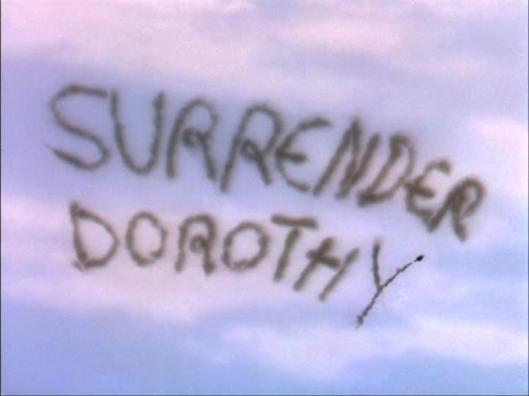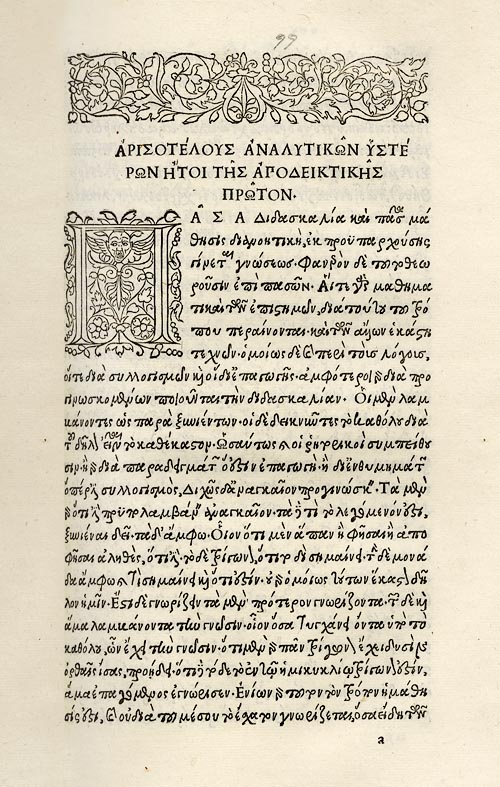Tags
Adventure, Aldus Manutius, Captain Cyril Turner, condensation trail, Epsom Downs, James Pollard, Let's eat grandma, Oz, punctuation, skywriting, Surrender Dorothy, The Wizard of Oz, the Wright brothers, Wicked Witch
Dear Readers,
Welcome, as always.
It was a bright, breezy morning yesterday and we were looking up at a contrail (short for “con(densation) trail”)

which brought to mind this message:

from the 1939 movie, The Wizard of Oz. At this moment in the movie, the four friends (and Toto),

seemingly welcome in the Emerald City, have been enjoying their welcome when the happy music stops at a shriek, and they look up to see the Wicked Witch of the West skywriting.
In the US in 1939, artificial flying objects would hardly have been a surprise. After 1903,

and certainly after the Great War

aircraft were increasingly common—even up to massive dirigibles.

Skywriting—

is said to have been first commercially employed in 1922 at Epsom Downs, in England,

where Captain Cyril Turner wrote “Daily Mail” over the race track.

(This is a painting by James Pollard from 1835, but we couldn’t resist its detail.)
It appeared over New York City for the first time shortly afterward.
In Oz, however, the usual airborne objects appear to have been:
- crows

- witches


- monkeys


(To which we might add 4. balloons—although there is only one and it’s not a native product.)

Thus, a thing like a flying house

would have been more than a little disturbing (and still is, here in this world)—especially when it landed on a major political figure.

As well, although witches fly in Oz, as far as we know, they are not given to delivering messages by air.
(This message, by the way, was:
- made by using a hypodermic needle filled with black ink to write on the bottom of a glass tank filled with colored water
- originally longer—here is what it first said:
 )
)
Equally disturbing to us, however, is the ambiguous (from Latin amb-, “both” and ag- “to drive”—hence, “to go in two directions”) nature of the message—all due to a (potentially) missing comma.
Modern western punctuation took several centuries to appear and mature, beginning with the work of the early printer, Aldus Manutius (the Elder—1449-1515) in the later 15th century.


On the whole, modern native English-speakers tend to use the same practices, although an inverted prepositional phrase in American English, for example, has a comma, where British English does not.
Uninverted: There were about twenty fresh crabs in the sink.
Inverted (US): In the sink, there were about twenty fresh crabs.
Inverted (UK): In the sink there were about twenty fresh crabs.
When this is spoken by any native-speaker, there is a slight pause after “sink” and the point of the comma (a point which goes back to 16th-century rhetorical texts, in which punctuation is intended to be used like rests in music, as a series of directional signals as to pauses) is to signal that natural pause.
There is no ambiguity either way in the model sentence, but what about in the Witch’s command?
As it stands, “Surrender Dorothy”, without a comma, is a kind of general imperative—it could perhaps be addressed to all of Oz—and thus easily explained in a longer construction, like “Oz! Surrender Dorothy”—perhaps with the original conclusion “or Die!”
But is this the Witch’s intention? Insert the comma and you have a command directed specifically—and solely–to Dorothy: “Surrender, Dorothy!” (As we learn when Dorothy is in the hands of the Witch, the deleted part of the message “Or Die” is not quite accurate—the Witch wants the Ruby Slippers, but can’t get them without killing the wearer, so that the real message should be “Surrender, Dorothy—and Die!”—which is hardly likely to be persuasive!)
There is a cartoon about English punctuation which has circulated for some years:

In the version without the comma, it’s an invitation to eat grandma. With the comma, it’s an invitation to eat with grandma. In the case of the Witch’s message, what do you think: is it a command to Oz, or to Dorothy?

Thanks, as always, for reading.
MTCIDC
CD
Or perhaps, “Surrender, Dorothy, [the ruby slippers], or die. But that’s a lot of ellipsis and inversion, I suppose.
LikeLike